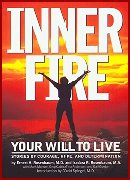Fifth Dimension Site Map Search Contact Us

|
I Don't Have Time Not to Live |
|
When I was given my diagnosis that I had a possibly fatal malignancy and I had to take chemotherapy in order to live, it didn't change my style of life at all, except that I, of course, got tired. I pretty much knew even before I saw the doctor that I had breast cancer because of the physical signs: the shape of the breast and so on. I wasn't angry when they said that the breast was probably going to have to come off. Angry isn't the right word. I was mad at being inconvenienced by it. The operation and the subsequent treatment of chemotherapy and radiation obviously took their toll on me but didn't really change my lifestyle a whole lot. I had complete confidence in my doctors, and I just knew I was going to get over it and get through it. My doctor's care and encouragement were extremely valuable to me. Every time I went to see him, I got a hug and was told how nice I looked. Such support is wonderful, such caring. A doctor can be very important as far as making you feel that you're still a woman, that even with breast cancer, you're still going to come back.
I remember, finally, one day about four months after I had finished everything, I woke up in the morning and felt like myself again. At my next meeting with the doctor, I told him this, and he said, Well, you look like you did back when I first met you." My nurses were also incredible, especially one named Irene. If I could have made Irene a saint, I would have. To me, she is the one who most helped me through everything. I've watched her with people who were not going to get better, and her kindness is incredible. I think I had such confidence in what was happening to me, the treatment that I was getting, because of the positive attitude of my doctor, Irene, and everybody in that office who cared. Even the girls out at the front desk cared. They made me feel like I was part of the family. It is also very important to trust the people who work with you. From the first moment I walked into my doctor's office, I trusted him. He told me what he was going to do, and I said, "Okay, that's fine. Go ahead and do it tomorrow." Trust is very important. There is a great connection between the mind and the body. Whatever brings you joy and pleasure, relaxation in life, whether it's reading or watching old movies, listening to opera or jazz, or playing with the grandkids, you have to have that in your life. Especially when you're fighting something like cancer. I've been through several other accidents that have almost killed me. And each time I survive one of these things, I have an even stronger feeling that there is something more for me to do before I go. I often don't know what I need to do specifically, of course. Some of it has to do with my involvement with opera and with education and scholarships. But I know there's something out there I still have to do, and it will present itself. My strong will to live is based, I think, on the fact that right now I'm too busy to die. I'm doing too much, things that I feel are really important in more than just my life but also in other peoples' lives. I had been doing that for about ten years prior to coming down with cancer, and I'm still doing it: helping others enjoy life. So, I still feel that I just don't have the time. I don't have time not to live. I live a very busy life, both in life and in enjoyment. There's no time to sit down and cry. I've never had time in my life to sit down and cry, and I didn't when my breast cancer was discovered. I certainly got depressed, but I had wonderful support from my family. My son said, "Hey, Mom, come on. Let's go do this." All my golfing ladies said, "Well, come on, you'll probably hit the ball better, now, when you get your strength back." That sort of encouragement is important. I don't know where my certainty of not dying yet came from. I'm not a very religious person, but I did sit down and pray before I started my treatment. I asked God to let me get through this, and I asked Him to help me not get too sick. And He answered my prayers. I had the great fortune of never having any bad side effects. The best way I can summarize my feelings about the will to live is to recall an incident I had right after my surgery. I was sitting across from a woman who had cancer and who was scared to death. I looked at her and said, "Hey, I'm okay. I'm shooting for ninety-two, and I'm enjoying life." That's not bad. |
|
You are welcome to share this © article with friends, but do not forget to include the author name and web address. Permission needed to use articles on commercial and non commercial websites. Thank you.
First appeared July 5, 2007; updated June 10, 2009